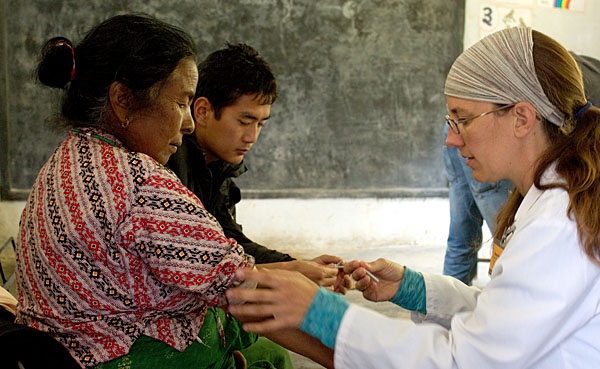
Chapagaon is surrounded by beautiful terraced rice fields. The fields are broken up into small plots that are farmed, by hand, by individual and groups of families. I see many of these family members as my patients in the Vajra Varahi Clinic. Ever since my arrival I have been taking long walks around the village wondering about the way the rice is farmed and harvested.
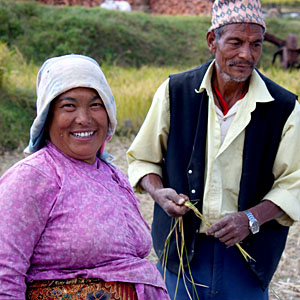 One day I was talking to a patient about her work in the fields and how this was effecting the pain she had in her body. I mentioned that before I studied acupuncture I too had been a farmer. In fact, I've longed to see these terraced fields of rice since I started farming more than 15 years ago. Rice is a staple food, and yet it's growth and harvest has always been a mystery to me. My patient looked at me in disbelief but after I asked a few more questions she invited me to come help in the fields if I wanted. This seemed like an opportunity I couldn't refuse.
One day I was talking to a patient about her work in the fields and how this was effecting the pain she had in her body. I mentioned that before I studied acupuncture I too had been a farmer. In fact, I've longed to see these terraced fields of rice since I started farming more than 15 years ago. Rice is a staple food, and yet it's growth and harvest has always been a mystery to me. My patient looked at me in disbelief but after I asked a few more questions she invited me to come help in the fields if I wanted. This seemed like an opportunity I couldn't refuse.
A few weeks later the summer rains finally stopped, the rice began to yellow and the rice kernels were full. The family of one of our interpreters, Satyamohan, had a few fields of rice that were ready to harvest. His father, Dan Bahadur, is the caretaker of the Monastery grounds that the clinic is on. Their harvest day fortunately lined up with our day off and he arranged for us to help.
We walked out to the fields and found the small plot of land that we were to harvest. I was given an iron sickle and we began cutting the rice stalks and gently placing them into piles. Next, they set up the threshing machine, set out tarps and began to bring over the piles of rice. My fellow practitioners and I watched excitedly, wondering how it was all going to work.
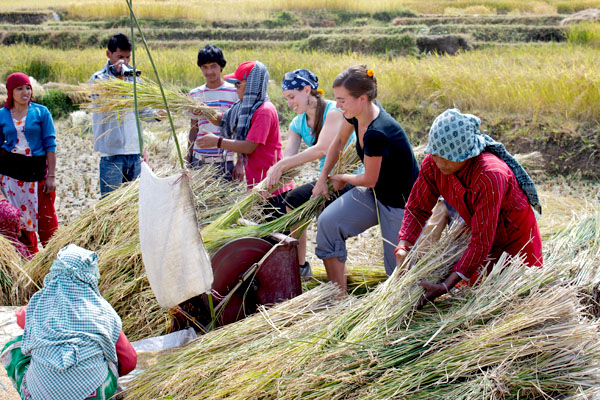
The metal threshing machine had been carried on two bamboo poles out to the fields. It has a barrel with metal spokes all over it. Powered by a foot pedal that you pump to make the barrel spin around I quickly found that it takes a little coordination. Once you get the barrel spinning, you take a bundle of rice and put seed heads against the barrel. The metal spokes knock the rice grain off the stalk and as it falls to the ground and it is caught by a tarp that is underneath. The rice is then swept into a bigger pile, winnowed and cleaned by another group of women. There are so many hands involved!
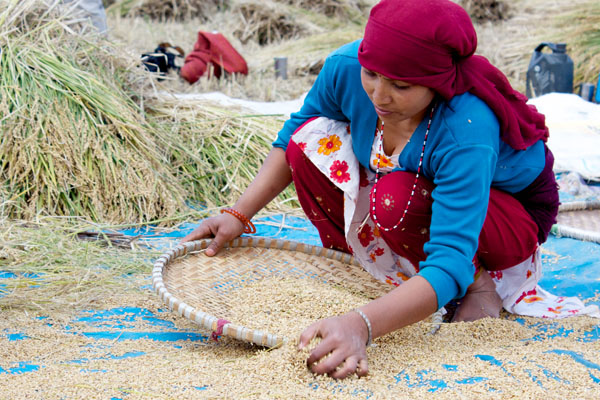
After we watched for a while they let us have a turn at pedaling the thresher. Eventually they kicked us off so that the professionals could get to work. After the rice was cleaned it was bagged up into big sacks which needed to be carried to the nearby road. We were then taught how to carry the bag of rice, using the head strap across our foreheads that also wrapped around the middle of the sack. We each carried a bag (while everyone had a good laugh at our expense) over to the road. I had immediate appreciation for the people that carry these loads every day and now understood why so many of my patient's have such strong (and sore!) necks.
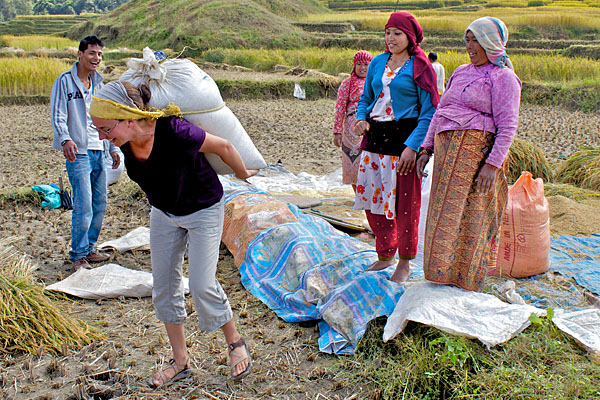
We also learned how to carry a water pot, One arm wraps around the neck and the bottom rests on your hip. The problem is that it rests right on your hip bone, which is uncomfortable after about 100 feet. The other challenge is trying to keep all the water in the pot. We all took a turn and realized why the women wear a wrap around their waist, to pad their hips and support their backs. This wrap is called a Patuka in Nepali, or Jannai in Nawari. Carrying the water pot also makes you walk with one hip off center offering some insight as to why the women here have such back and hip issues.
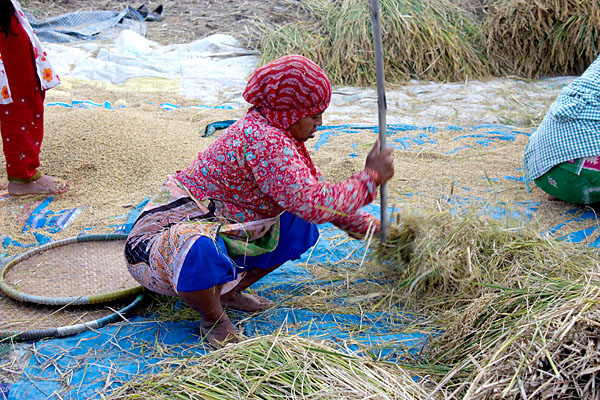
I felt so at home in the fields that day and I suddenly realized that I was becoming a part of this community. I hadn't considered how quickly this could happen, even when I have only been here for eight short weeks. Everyone was so excited that we were there, interested in knowing how they live and work. I was honored to be there. This brief experience helped me connect to the land, the people and the lifestyle in a way that I couldn't have previously imagined. My heart is so full from having had this opportunity to grow as a medical provider (and as a farmer)... it is going to be a difficult place for me to leave behind. ---Stacey Kett











